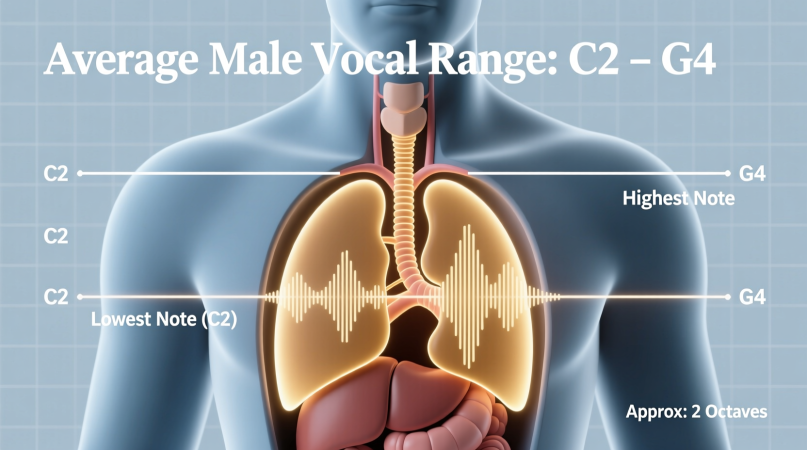
When people talk about singing ability, one of the first things that comes up is vocal range. You’ll often hear comparisons like “He has three octaves” or “That guy can sing higher than most women.” But realistically, what’s the average vocal range for a male?
This article breaks it down with clear examples, comparisons, and tips you can actually use.
Understanding Vocal Range
A person’s vocal range refers to the span between their lowest and highest notes. It’s usually measured in octaves, each covering 12 semitones.
Example:
- From C2 to C3 = one octave.
- From C2 to C4 = two octaves.
Two important distinctions:
- Maximum range – the extreme lowest and highest notes you can squeak out.
- Usable range – the notes you can sing consistently with good tone.
When we say “average male vocal range,” we mean the usable span.
The Average Range for Men
Most studies and vocal coaches agree:
- The average male range is about 1.5 to 2 octaves.
- Typically this falls between F2 and E4.
That covers a lot of popular music, from low verses to higher choruses.
Quick Overview
- Untrained men: ~1.5 octaves
- Trained singers: 2–3 octaves
- Exceptional cases: 4+ octaves (rare)
👉 You can easily measure your span using an online vocal range checker to see where you stand.
Male Voice Types Explained
Classical music uses categories to describe male voices. These types help us place the “average” in context.
| Voice Type | Typical Range | Famous Examples |
|---|---|---|
| Bass | E2 – E4 | Johnny Cash, Barry White |
| Baritone | F2 – G4 | Elvis Presley, Frank Sinatra |
| Tenor | B2 – C5 | Luciano Pavarotti, Freddie Mercury |
| Countertenor | G3 – D5 (falsetto-heavy) | James Blake, Klaus Nomi |
Most men naturally fall into the baritone category, which explains why F2–E4 is often quoted as “average.”
Male vs Female Average Ranges
How do men compare to women?
- Female average range: around 2–3 octaves (A3 – A5 is common).
- Male average range: 1.5–2 octaves (F2 – E4).
This natural separation is why choirs sound balanced—each gender fills different parts of the spectrum.
Singers With Extraordinary Ranges
While most men fall near 2 octaves, some go far beyond:
- Freddie Mercury – ~4 octaves, legendary versatility
- Axl Rose – credited with a 5+ octave span
- Michael Jackson – about 3.5 octaves, agile falsetto
- Tim Storms – Guinness World Record holder, more than 10 octaves
Clearly, exceptional range is possible, but not necessary for artistry.
What Shapes a Man’s Vocal Range?
Range is not fixed—it’s influenced by multiple factors:
- Physiology: Vocal cord length and thickness
- Training: Breath support, resonance, register blending
- Age: Voices deepen in teenage years and can lose top notes with age
- Health: Smoking, strain, or fatigue narrow your usable span
How to Test and Improve Your Range
If you’re curious about your range:
- Warm up your voice.
- Use a keyboard app or piano to descend to your lowest clear note.
- Climb upward to your highest comfortable pitch.
- Count the octaves between.
With consistent practice, many singers can add notes over time.
👉 To monitor progress, try this vocal range calculator tool and log changes as you train.
Average Range vs Tessitura
The tessitura is the part of your range where your voice sounds best and feels easiest to sing.
For example, a singer might span F2–C5, but sound most natural between A2–F4. Tessitura often matters more than the total range when choosing songs.
Myths About Male Vocal Range
- “More octaves means you’re a better singer.” Not true—tone and control win.
- “All men should hit at least two octaves.” Some can do less without training.
- “Falsetto doesn’t count.” It does, as long as it’s strong and usable.
FAQs
What’s the average male vocal range?
Roughly 1.5–2 octaves, usually F2–E4.
Which male voice type is most common?
Baritone—sitting right in the middle.
Can training increase my range?
Yes, with safe techniques you can often add half an octave or more.
How does aging affect range?
Younger men gain depth after puberty, while older men may lose high notes.
Do I need a wide range to sing well?
No. Control, tone, and emotion are more important than hitting extremes.
